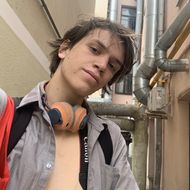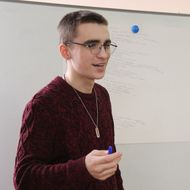‘Student Ideas Shed Light on Key Challenges for Urban Development’

The first international joint summer school of the Vysokovsky Graduate School of Urbanism (GSU) at both the HSE Faculty of Urban and Regional Development and Brest State Pushkin University (BrSU), hosted by BrSU, has come to a close. The programme focused on studying buffer zones along the railway lines encircling the city centre. Participants included students from the GSU’s Urban Planning degree programme, as well as students from BrSU and Brest State Technical University.
Nineteen participants of the joint summer school completed a lecture course, carried out field research, worked in themed groups, and successfully defended their projects.
In their fieldwork, students explored the area and its history, collected up-to-date data from open sources and through on-site observations, and then moved on to group project work.

Maxim Bogdasarov
‘This is the first urban studies summer school held at our university, and it is a natural stage in our cooperation with HSE University,’ said Maxim Bogdasarov, Vice Rector for Science and Professor at the Department of Urban and Regional Development at BrSU. ‘We are proud knowing that this initiative came from our Moscow partners, who have extensive experience in running various summer schools. We are especially pleased that Brest has been chosen as the location for our next joint project. This is an important step in developing our Urban Studies and City Management programme, as the work is practice-oriented, enabling us to learn together with our colleagues.’
The international summer school brought together HSE and two universities in Brest—Brest State Pushkin University and Brest State Technical University. Participants were divided into four teams, each comprising representatives from all three institutions. ‘This line-up created a powerful synergy, as students exchanged knowledge and experiences both formally and informally during project work and city exploration,’ noted Maxim Bogdasarov. ‘Each team presented their own vision of the identified challenge—the interaction between the railway system and the urban environment. It is young researchers who identify opportunities, limitations, and ways to overcome challenges. The results of their work are the school’s main achievement, as the goal was to encourage collaboration, gain new knowledge from lecturers, study the city’s territory, and become familiar with the specifics of railway operations.’
The school’s participants visited Brest-Central and Brest-North stations, worked alongside railway staff, and gained valuable experience. ‘Now we look forward to seeing the fruits of their efforts, and I am convinced that the positive experiences will continue. Our Moscow guests spoke highly of Brest’s atmosphere and expressed their desire to carry on with such projects in the future,’ said Maxim Bogdasarov.
He also emphasised the active development of cooperation between Brest State Pushkin University and HSE University: ‘We have previously held a week dedicated to challenges in “smart” cities, and now we have organised a school on the interaction between railway infrastructure and urban spaces. I am sure there are many more promising opportunities for joint research, discussions, and exchange of ideas.’
The four teams developed conceptual projects, each focusing on a different section of the railway area. In the western zone, which borders the city’s main landmark, the Brest Fortress, participants proposed enhancing recreational and commercial activities, filling an almost empty part of the city and bridging both the physical and conceptual gap between the city centre and the fortress.
On the eastern side, where there is dense multi-storey and detached housing, the team proposed making a creative cluster with offices and affordable rental spaces for local artisans in the building of a former furniture factory. The northern team focused on the area around the main railway station and, in addition to improving connectivity, suggested highlighting the historical importance of the railway for Brest through tourist routes and dedicated sites. One team worked on a special area in the north-east, where they fully unleashed their imagination towards gentrified development, proposing the construction of a large business centre.
All students’ presentations were evaluated by Maksim Klimanov, an expert from the Vysokovsky Graduate School of Urbanism; Associate Professors Anna Karoza and Sergei Zarutski from BrSU; and Tatiana Panchenko, Director of the Brest City Centre for Architecture and Construction.

Vlad Kotvin
‘Brest is a growing city, but it aims to develop in a compact manner and increase its density, as this is the most efficient way to make use of its infrastructure,’ said Vlad Kotvin, a second-year student of the Urban Planning programme at the Vysokovsky Graduate School of Urbanism, HSE University. ‘Our team was convinced that such potential lies near the railway. These lands are already populated, so it is essential to strike a balance between public interests and residents’ rights to a comfortable living environment.’
This project was his first teamwork experience. ‘Every team member brought unique skills to the table: architects, urban planners, and urban studies specialists were able to show their strengths thanks to clear task allocation,’ he noted. ‘This allowed us to focus on specific objectives and appreciate the significance of our contributions.’

Vitaly Sirotin
Vitaly Sirotin, a third-year student of the Tourism and Hospitality programme at BrSU, collaborated with his team to analyse and enhance transport links between the city’s railway and bus stations. ‘Our area is rich in historic landmarks and tourist attractions, which we also worked with actively, proposing ideas for their integration into the urban fabric. Residents often mentioned there was nothing to do at the station, so we suggested bringing station complexes into city life by improving accessibility and organising interesting events,’ emphasised Vitaly Sirotin.
He enjoyed the teamwork experience: ‘The school was not only fun but also productive; the guys were excellent specialists and true professionals in their fields. Special thanks go to the lecturers from the Vysokovsky Graduate School of Urbanism for their memorable talks.’

Tatiana Demidova
The project of Tatiana Demidova’s team, a second-year student of the Urban Planning programme at the Vysokovsky Graduate School of Urbanism, HSE University, involved rethinking spaces influenced by railway infrastructure. ‘We viewed Brest-Central not simply as a transport hub but rather as an important historic landmark. Our task was to highlight the cultural significance of the railway station and its surroundings,’ said the student. Her team proposed creating tours with audio guides and a navigation system for the city’s central district: ‘We also included entirely new elements in the tour programme—light installations on building and carriage façades, an outdoor interactive railway museum, restored water towers, and, of course, the magnificent railway station itself.’
The summer school gave her invaluable experience, fresh knowledge, and new connections. ‘The most important thing I personally learned was how to work effectively in a team with set objectives, goals, and deadlines, as well as to grow from mistakes and carry out my work with confidence,’ she said.

Maksim Babenko
‘The essence of our project was to develop a plan for improving the buffer space near the railway in Brest,’ said Maksim Babenko, a third-year student at Brest State Technical University. ‘We split into teams and worked on specific parts of the area, conducting interviews with local residents, researching property prices, and analysing the current level of development.’
For Maksim, the experience at the summer school was incredibly inspiring. ‘The tutors immersed us in the work process, offered valuable advice, helped us form effective teams, and supported us throughout the summer school programme.’

Diana Kodzokova, Deputy Dean for Research of the HSE Faculty of Urban and Regional Development, Tutor of the Summer School
‘Many of the student ideas are ambitious, yet they shed light on key challenges for the city centre’s further development. Brest has a unique railway history and stands at a crossroads between Europe and Asia. It was important not only to focus on the constraints imposed by such infrastructure on spatial development, but also to view our site through the lens of values. This approach allowed the students to develop proposals for tourist routes, museum and exhibition programmes, and the use of railway facilities in the city’s festival agenda, such as on Railway Workers’ Day. These solutions require minimal investment and represent “quick wins” for the city in boosting its tourist appeal.’
See also:
HSE University Students and Postgraduates Take Part in Peking University International Summer School
In July 2025, Peking University hosted its annual Quantum Molecular Dynamics Summer School, which has moved onto an international stage. Its first foreign guests were students and postgraduates from the HSE Tikhonov Moscow Institute of Electronics and Mathematics (MIEM). They took part in an extensive academic programme and had the opportunity to visit a laboratory that works with optoelectronic materials and energy devices.
‘A Laboratory at 3,000 Metres’: HSE University–St Petersburg to Start Call for First Summer School in Himalayas
HSE University–St Petersburg has announced the call for the Summer School in the Himalayas, which will take place from June 30 to July 13, 2025. The Summer School is the follow-up to two expeditions in the Himalayas organised by the St Petersburg School of Social Sciences in 2024. The programme allows bachelor's, master's, and PhD students to immerse themselves in research on climate change and sustainability in local communities in the unique natural laboratory of the Himalayan region.
From Sequencing to Constructing a Cardio Panel: Summer School in Cardiogenetics
From August 19 to 29, the Continuing Professional Development Centre of the HSE Faculty of Computer Science hosted the summer school 'Cardiogenetics: From Sequencing to Constructing a Cardio Panel,' organised in collaboration with the Russian Academy of Sciences' Institute of Analytical Instrumentation (IAI) and Institute of Spectroscopy (ISAN), and the Syntol company. The summer school was conducted within the framework of the Federal Research Programme for Genetic Technologies Development for 2019–2027 (Project 15.IP.21.0004).
'These Are Unforgettable Impressions, I Will Cherish Them Forever'
HSE St Petersburg International Summer School is in full swing—right now, international students from 12 countries are attending lectures and enjoying the cultural programme. The HSE News Service talked to the participants about their most vivid impressions.
HSE University-St Petersburg Hosts Students from 12 Countries at the International Summer School
On July 10, HSE University-St Petersburg launched the International Summer School—a series of classes for students from India, Vietnam, the Republic of Korea and other countries. Foreign guests are getting to know the university, attending lectures in six fields of study, and enjoying an inspiring cultural programme.
The XI Russian-Chinese Summer School on International Relations Kicks Off at HSE University
On July 1, 2024, the opening ceremony of the XI International Russian-Chinese Summer School on International Relations, titled ‘Partnership and Cooperation in the New World Order,’ took place. The event was organised by the HSE Faculty of World Economy and International Affairs in collaboration with HSE Centre for Comprehensive European and International Studies (CCEIS). Graduate and postgraduate students from various countries have come to Moscow to study international relations and collectively envision a new world order.
HSE University Holds 10th Summer School ‘Eye-tracking in the Lab and Beyond’
This year, more than 100 students from Russia and abroad took part in the 10th summer neurolinguistic school, ‘Eye-tracking in the Lab and Beyond’. The school is held annually by the HSE Center for Language and Brain. Leading experts spoke about advanced developments and research in the field of video-oculography.
Data Analysis and Personalised Medicine: Summer School in Cardiogenetics
The Continuing Professional Development Centre of the HSE Faculty of Computer Science has recently hosted the summer school 'Cardiogenetics: From Sequencing to Constructing a Cardio Panel'. The school programme was co-organised by the Russian Academy of Sciences' Institute of Analytical Instrumentation and Institute of Spectroscopy and the Syntol company.
‘Interest in the Application of Machine Learning in Bioinformatics Is Growing by the Year’
On August 28–30, HSE University’s Faculty of Computer Science held the 4th Summer School on Machine Learning in Bioinformatics. This year, 670 people registered for the event, and over 300 visited in person. The programme included lectures and seminars on various spheres of bioinformatics: applied bioinformatics and the bioinformatics of DNA, RNA, and proteins; elementary genomics; modern methods of data analysis and molecular biology. The lectures were complemented by practical tasks aimed at different levels of knowledge.
HSE Faculty of Computer Science Holds Summer School on Software Engineering
At the beginning of July, a summer school on software engineering was held at the HSE Faculty of Computer Science. This is the successor to the school on mobile applications development, which was held at the FCS from 2015 to 2022. The school’s partners for this event included 1C, Sber, the community of authors of the Indicator games, and the Samsung Innovation Campus IT School.


